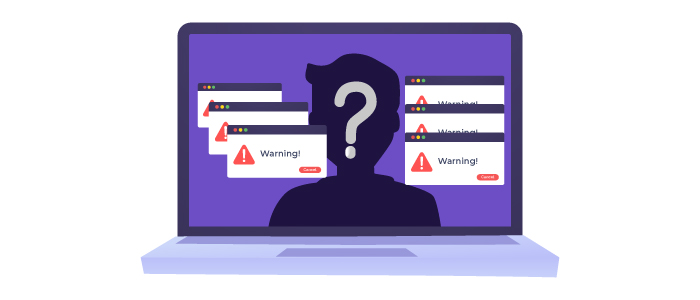Is Digital Marketing Legit? Find Out the Top Scams and Myths
After all this time, especially since the most innovative technologies have become mainstream, we are left to wonder and roam around the internet forest, endlessly asking, “Is digital marketing legit?”
Indeed, as marketers, we must always take advantage of real-time marketing opportunities. Yet bad actors can be found in any industry, and marketing is no exception. But how do we manage situations when our clients’ perceptions of digital marketing’s effectiveness are highly uncertain?
Well, this article will dive into the top scams in the digital marketing field and the most popular myths that contribute negatively to the overall digital marketing market.
Top 10 Digital Marketing Scams

Until now, you might have convinced yourself that digital marketing is pretty legit, right? And yet, somehow, bad-intentioned marketers raise that question by promising some unrealistic things or using questionable strategies.
Let’s examine the details and learn more about some of the most common and most used digital marketing scams to ensure your safety and avoid falling prey to bad actors.
1. Unrealistic Promises
One of the most popular and widely seen scams in digital marketing is the promise of instant success. Indeed, some agencies or freelancers claim they can guarantee top rankings on Google or a massive increase in traffic within days.
Yet, whether you are a beginner, advanced marketer, or business owner, the rule of thumb is that digital marketing requires consistent effort, time, and strategic planning. SEO, for instance, can take months to show significant results due to the need for ongoing optimization and the time it takes for search engines to index changes.
So, always pay attention to anyone who claims they can deliver overnight success, as these promises are often too good to be true.
Also, when someone advises that your traffic will skyrocket in the next few days or weeks, it is often a promise made in vain and could lead to bot traffic signals, which in 2024 compose 42% of the overall web traffic. So, take the time and do proper checks before and after accepting any marketing offer.
2. Fake Reviews or Testimonials
Trust is crucial in digital marketing, and some marketers exploit this by generating fake reviews or testimonials. Some might post fabricated reviews on Google, Yelp, or social media platforms to build a false sense of credibility, which can mislead potential clients into believing they are hiring a reputable service.
It’s important to verify the authenticity of reviews by looking at third-party review sites, such as TrustPilot, G2, or even Gartner offer product reviews while asking for references or case studies from previous clients. Real testimonials often include specific details and context that fake ones may often lack.
To spot fake reviews, please check the following:
- See if the reviewer is legitimate, check the timeline, and if the reviewer has left any other reviews. Also, you can check whether the purchase is verified, as many platforms started incorporating this method to cut down the weeds.
- Check grammar, spelling, and any red flags that could signal an AI written or bot review.
- Look for details that suggest the product has been purchased and tested and the review is authentic.
3. Useless Backlinks
We all know that backlinks are vital for SEO. However, not all backlinks are equal. Why is that?
Some companies offer to sell backlinks, often at a low price, claiming that they will boost a website’s ranking. Such backlinks usually come from low-quality, irrelevant websites, which may do more harm than good.
Therefore, search engines can penalize websites that do not optimize their pages fairly, so try to avoid such practices. Also, be sure to read more on Google’s spam policy page. They take this approach seriously, and you risk having your website ranked lower.
4. Cheap, Fast, and Easy Leads
Generating qualified leads is a key goal in digital marketing, but offering cheap, fast, and easy leads is often risky for a business. Let us explain to you why that is.
High-quality leads require a strategic approach, including targeted advertising, engaging content, and well-developed campaigns. Companies that promise many leads quickly often use methods like buying email lists or bots, resulting in low engagement rates and fewer conversions.
This approach is also used for business directories, as bad actors are the perfect disguise for marketing expertise, quick talks, and high-pressure selling techniques. Yet, you can avoid these by taking the time to research each offer properly, understand the process, and come to a conclusion before paying.
5. Social Media Click Farms and Buy Followers Scams
Often found in developing countries, social media click farms inflate a brand’s presence by having users click, engage, and even buy fake products, depending on the niche. Indeed, for some, it could be a practical approach, yet the engagement isn’t real and doesn’t have organic and tangential outcomes.
In contrast, you should start from the top to bottom and nurture your followers’ base from awareness until consideration and conversion. As such, your posts should be based on a marketing strategy and content pillars, and you should adopt a retargeting or remarketing strategy to ensure you catch those who interact with your brand. In addition, you should be an authentic brand that directly answers users’ needs.
Even so, you should take extra steps to ensure a proper customer service experience to boost your brand trust, loyalty, and retention.
6. Falsified Back Catalogue
We live in an era of fake products, and fake client portfolios are no exception. As a result, falsified back catalogs are a popular digital marketing scam that could lead to legal implications. You receive an outreach from said agency or freelancer that showcases his (fake) portfolio, promising to help you with your business endeavors.
But everything is fake: from clients to performance reports and even its offerings. So, what should we do about it?
For starters, research the agency or freelancer properly, meaning check the website, social media posts, and clients. If something seems sketchy, note it down for further discussion, and you can ask for a recommendation. Indeed, some measurements seem a bit off-put, yet it is best to ensure you’re on the safe side rather than being sorry.
7. Domain Name Renewal Scam
This one is an oldie but goldie, and even these days, it is still used to scam businesses. Anyone must renew their domain, so scammers use the ICANN Lookup to gather all the necessary details, such as your name, email address, and domain expiration dates, and then persuade you to renew it, or else you could lose it.
From here, things could go south in two ways:
- You either pay them the renewal amount, receive a fake receipt, and think anything is good and in place;
- You transfer the domain registration to them and, ultimately, lose your domain access.
The best, safest, and somewhat only way is to check anything with your domain registrar via live chat, phone support, or email. Second, when you receive any contact regarding your domain expiring, check your email from your registrar, as when a phishing trend comes up, they are usually on the spot and even send email campaigns to all their customers.
8. The Cheap Website Scam
These days, every business, solo entrepreneur, or freelancer needs a website, right? This is the premise of this scam, as businesses aim to balance cheap yet very qualitative websites with flying spaceships and all the possible add-ons. Usually, these end up being just some copycats and may get blacklisted from Google.
This doesn’t sit quite right, which is why this scam is still used today. When investing in your brand, company, and website, you should always go with certified professionals as much as possible. As with any digital product is more about what is behind the curtains, meaning to have a user-friendly website with a robust UI/ UX design to ensure you attract, nurture, and retain visitors.
Regardless of your service and offerings, your website role, along with other marketing efforts, is to have a good conversion rate however you see fit for your business.
9. Outsourcing Content Scams
Nowadays, with AI getting mainstream, anyone is a content marketer. Well, it’s not, and here’s where this scam takes place. When you go with an outsourced content team, ensure you take multiple offers and carefully review them, besides asking for writing examples.
Indeed, outsourcing might be cheaper, but often it comes with a low-price and low-quality ratio. Thus, you might reinvest time, effort, and resources to make the best of it.
10. The Influencer Marketing Scam
Indeed, influencers are everywhere, and more than ever, they request free goods and services in exchange for a social tag, post, or mention to spark interest within their community. Moreover, recent reports show that the influencer marketing niche is about to reach $24B by the end of 2024, while almost 60% of businesses are planning to integrate such method within their strategy.
If your niche is compatible with this marketing approach, go for it. If you’re unsure, do proper research before jumping in, as your brand could become irrelevant, and you could lose financial resources.
Here’s the thing: if you have your mind set on a certain influencer, see how the influencer aligns with your target audience, as the influencer will be a thought leader. Then, see what exactly your brand needs from such a collaboration.
Finally, as with any purchase or investment, check the influencer’s eligibility. Look at the influencer’s bio, monitor their online activity for a while, who else is following them, what other brands collaborate with them, and so on.
3 Tips to Avoid Getting Scammed
Tips #1: Research all the way
As with any investment, proper research before investing is mandatory. Thus, you need to research your digital marketing needs, then assess your implications, and ultimately draw the line on what and how you need what you need.
Tip #2: Ask for References
This one is probably the most at hand and the easiest to spot scammers within the digital marketing industry. As such, before hiring a new marketing agency, influencer, or outsourcing, it is best to ask for a reference.
Thus, you can contact the clients and ask specific questions regarding the collaboration. Word of mouth will always be the best tactic, and if something goes wrong, others will be more than understanding and give raw feedback.
Tip #3: Reporting should be at its finest
As with any business, when allocating budgets for your digital marketing efforts, you must have a track record of what you paid and got. So, asking for weekly, monthly, and quarterly reports is part of the process, and even though your new SEO strategy doesn’t bring instant results, you’ll still see a minimum of traction. In this instance, the performance reports should speak for themselves.
Also, marketers speak a tech-specific language, so don’t be embarrassed by asking the most obvious questions. You don’t need to know rocket science, and usually, if something is fishy, you will get it.
Debunking the Top 5 Digital Marketing Myths

1. Content Is the First Priority
It should be no surprise to marketers and businesses alike that content is extremely important. You cannot easily engage with your audience without relevant and reliable content. However, content should not be the only priority in a successful digital marketing strategy.
Effective digital marketing involves a complex approach. The content should use SEO, social media engagement, and email marketing strategies for better results. Take an article, for example. The content can be as bright as anyone dreams, but it needs proper SEO to rank well and reach a wider audience.
Focusing solely on content without considering other practices might limit its effectiveness.
2. Email Marketing Does Not Help
Email marketing has become highly underestimated, but it remains one of the most effective strategies in digital marketing when done right. Personalized and targeted email marketing campaigns can bring new leads, shorten the sales funnel, and maintain customers closer to your business.
For example, an e-commerce website might increase sales by sending personalized product recommendations based on past purchases and recent searches. This can increase many clients’ FOMO (Fear of Missing Out).
Email marketing can also help businesses segment their audience and build their messages to meet specific customer needs and pain points, thus leading to higher engagement and potentially more conversions.
3. Digital Marketing Is Not Required for Physical Sales
Gone are the days when businesses that only engage in physical activity and base their revenue on physical sales did not need an online presence.
Take local SEO, for instance. It can help businesses appear in search results for nearby customers. Positive reviews found online can convince potential customers to choose a specific local restaurant instead of another. Social media can help businesses promote their events and special offers, and the list can go on for so long.
4. Traffic Means You Are Successful
Let’s give what is Caesar’s to Caesar – high traffic is a positive sign. Still, high traffic does not always equal success. You should also consider the quality of that traffic and its ability to convert into sales.
For example, a certain social media post might become viral and attract many visitors (this is where high-quality content plays a vital role). Still, if those visitors are not part of a business’s target audience, the traffic spike will not result in significant business growth.
Businesses should find the right formula to attract the right audience and optimize their conversion funnel to turn visitors into loyal customers and, why not, advocates.
5. The Multi-Channel Confusion
It’s a common misconception that more channels mean better results. In reality, spreading efforts to too many channels can reduce the effectiveness of a digital marketing strategy. It’s crucial to identify the right platforms and channels for you, which can be done by first building your target audience. Learn more about where your audience spends time and focus on those channels.
Let’s say you are a B2B company just getting started with your digital marketing strategy. Would you engage with your target audience on TikTok or LinkedIn? We all know the answer to this question.
Thus, you should always focus on quality and relevance, and choosing the platforms and channels wisely can help you spend your budget more effectively.
So, Is Digital Marketing Legit?

Let’s start with a short conclusion followed by some explanations: digital marketing is as legit as you make, help, and let it be.
The most important factor is to use digital marketing properly. If you do this, it can lead to surprising growth, along with high-quality brand awareness and an improved customer base. We believe that the key to success may be understanding how to work with this concept, staying away from fake promises, and not considering various myths you will always hear from others.
Thanks to the evolution of data analysis, digital marketing can provide extremely valuable insights and measurable results. This allows businesses to optimize their strategies and campaigns even more and always be one step closer to success.
Tools like Google Analytics, social media insights, and email marketing-specialized platforms offer detailed metrics on user engagement and behavior, campaign results and effectiveness, and ROI, which can help marketers improve their approach to helping clients.
Such factors only contribute to proving that digital marketing is legit and is here to stay.